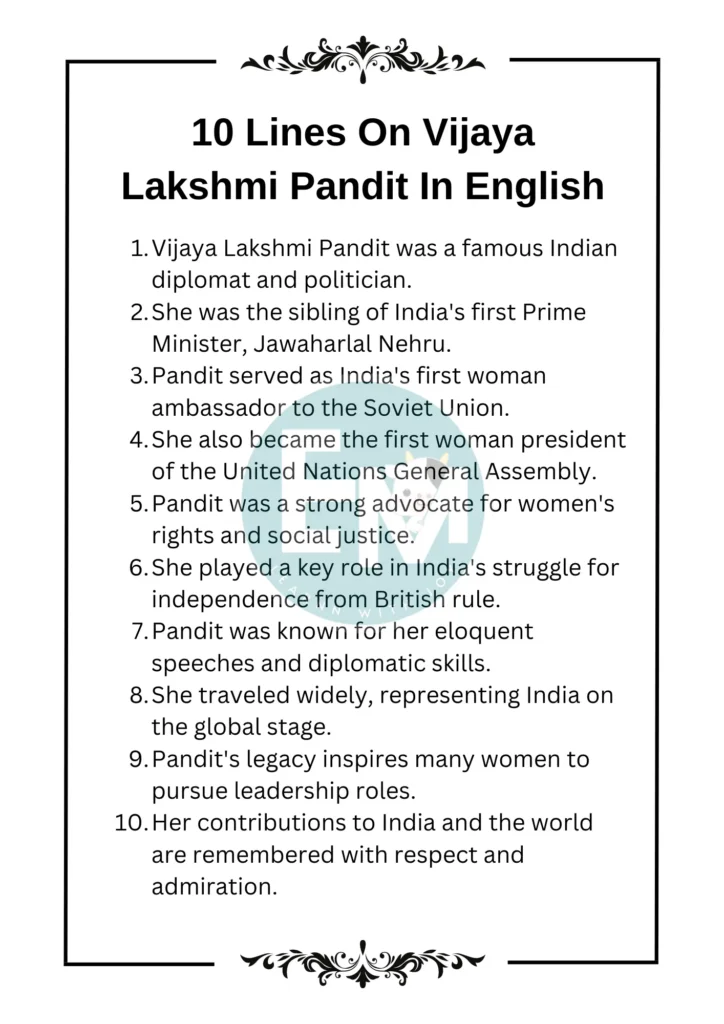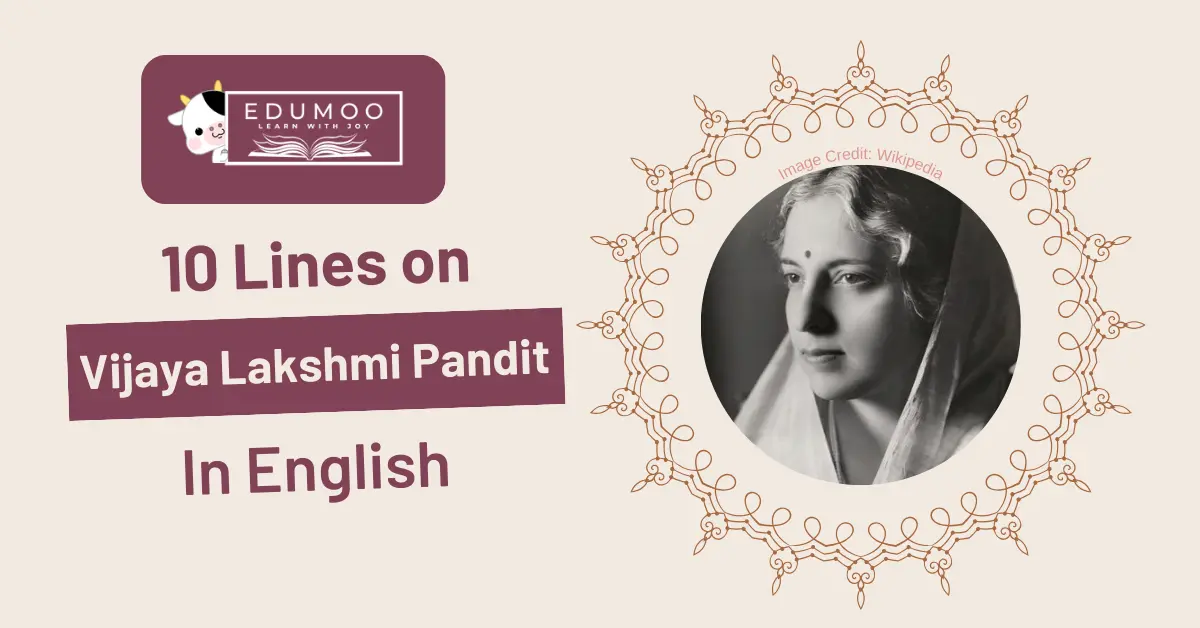Today, we will learn 10 lines on Vijaya Lakshmi Pandit. Vijaya Lakshmi Pandit, a remarkable figure in Indian history, left an indelible mark on the world stage through her diplomatic prowess and unwavering commitment to social justice.
As the sister of Jawaharlal Nehru, India’s first Prime Minister, she played a pivotal role in shaping the nation’s destiny. From breaking gender barriers to championing the cause of women’s rights, Pandit’s journey is both inspiring and instructive, especially for young minds eager to learn about influential personalities who have shaped our world.
10 Lines On Vijaya Lakshmi Pandit In English
- Vijaya Lakshmi Pandit was a famous Indian diplomat and politician.
- She was the sibling of India’s first Prime Minister, Jawaharlal Nehru.
- Pandit served as India’s first woman ambassador to the Soviet Union.
- She also became the first woman president of the United Nations General Assembly.
- Pandit was a strong advocate for women’s rights and social justice.
- She played a key role in India’s struggle for independence from British rule.
- Pandit was known for her eloquent speeches and diplomatic skills.
- She traveled widely, representing India on the global stage.
- Pandit’s legacy inspires many women to pursue leadership roles.
- Her contributions to India and the world are remembered with respect and admiration.

Essay On Vijaya Lakshmi Pandit In English In 400 Words
Vijaya Lakshmi Pandit, a name synonymous with courage, diplomacy, and leadership, holds a special place in the annals of Indian history. She was born in Allahabad, India, on August 18, 1900, and was the sister of Jawaharlal Nehru, who became India’s first Prime Minister.
From an early age, Pandit exhibited a strong sense of determination and a keen intellect, which would later propel her onto the global stage as a prominent diplomat and advocate for social justice.
Pandit’s journey to prominence began during India’s struggle for independence from British rule. She actively participated in the freedom movement, standing alongside her brother and other leaders in the fight against colonial oppression. Her eloquence and passion for justice made her a respected figure among her peers and earned her a prominent role in shaping the future of the nation.
Following India’s independence in 1947, Pandit’s diplomatic skills came to the forefront as she embarked on a distinguished career in international relations. She became India’s first woman ambassador, representing the country with grace and poise on the global stage.
Her tenure as ambassador to the Soviet Union and later as India’s High Commissioner to the United Kingdom showcased her diplomatic acumen and earned her widespread admiration.
One of Pandit’s most significant achievements came in 1953 when she made history by becoming the first woman to serve as the President of the United Nations General Assembly.
In this role, she championed the cause of women’s rights, advocating for gender equality and empowerment on the international stage. Her visionary leadership and unwavering commitment to social justice left an indelible mark on the United Nations and inspired countless individuals around the world.
Throughout her life, Pandit remained dedicated to serving her country and advocating for the rights of the marginalized and oppressed. Her legacy continues to inspire generations of leaders, particularly women, to break barriers and strive for excellence in their respective fields. Pandit’s life story serves as a reminder that with courage, determination, and a commitment to justice, anything is possible.
In conclusion, Vijaya Lakshmi Pandit’s contributions to India and the world are immeasurable. Her remarkable journey from a young woman in Allahabad to a respected diplomat on the global stage is a testament to the power of perseverance and the ability to effect positive change. As we honor her memory, let us remember her as not only a trailblazer in diplomacy but also as a beacon of hope for a better, more equitable world.
| Also Read: 10 Lines On How I Spent My Holidays |
Essay On Vijaya Lakshmi Pandit In English In 650 Words
Vijaya Lakshmi Pandit, a name synonymous with courage, diplomacy, and advocacy for social justice, occupies a prominent place in the annals of Indian history. Born into a family of luminaries, including her brother Jawaharlal Nehru, she emerged as a towering figure in her own right, breaking gender barriers and leaving an indelible mark on the global stage.
This essay explores the life and legacy of Vijaya Lakshmi Pandit, shedding light on her remarkable journey and enduring contributions to India and the world.
Vijaya Lakshmi Pandit was born on August 18, 1900, in Allahabad, India, into a distinguished family deeply entrenched in the Indian freedom struggle. Her father, Motilal Nehru, was a prominent lawyer and politician, while her mother, Swaruprani Thussu, was a devout follower of Indian traditions.
As a child, Vijaya Lakshmi Pandit grew up in a place where people shared smart ideas. She learned about being helpful, treating everyone fairly, and making sure everyone gets treated right from the start. Despite the prevailing societal norms that favored traditional gender roles, Pandit received a progressive education, thanks to her enlightened family.
Inspired by the ideals of Mahatma Gandhi and her brother Jawaharlal Nehru, Vijaya Lakshmi Pandit actively participated in India’s struggle for independence.
She joined the Indian National Congress and became deeply involved in the non-violent resistance against British colonial rule. Pandit fearlessly led protests, organized women’s rallies, and mobilized support for the cause of freedom. Her eloquence and dedication earned her widespread respect within the nationalist movement, establishing her as a formidable leader in her own right.
Following India’s independence in 1947, Vijaya Lakshmi Pandit embarked on a distinguished diplomatic career that would span decades and continents. In 1949, she made history by becoming India’s first woman ambassador, representing the country in the Soviet Union.
Her diplomatic acumen and statesmanship soon earned her accolades both at home and abroad. Subsequently, Pandit served as India’s ambassador to the United States and Mexico, further cementing her reputation as a formidable diplomat on the world stage.
Vijaya Lakshmi Pandit’s trailblazing journey reached its zenith when she was elected as the President of the United Nations General Assembly in 1953. In this role, she became the first woman to preside over the highest decision-making body of the United Nations, a testament to her global stature and leadership.
Pandit used her position to champion the cause of decolonization, advocate for human rights, and promote peace and cooperation among nations. Her tenure as President of the General Assembly remains a shining example of India’s commitment to multilateralism and international cooperation.
Throughout her illustrious career, Vijaya Lakshmi Pandit remained a steadfast advocate for women’s rights and gender equality. She recognized the pivotal role that women play in society and tirelessly campaigned for their empowerment and emancipation.
Pandit emphasized the importance of education, economic independence, and political participation for women, paving the way for future generations of female leaders. Her pioneering efforts laid the foundation for the women’s rights movement in India and inspired countless women to strive for equality and justice.
Vijaya Lakshmi Pandit’s legacy endures as a beacon of hope and inspiration for generations to come. Her courage, resilience, and unwavering commitment to the principles of justice and equality continue to inspire millions around the world.
From breaking gender barriers in diplomacy to advocating for social change, Pandit’s life exemplifies the transformative power of individual action in shaping the course of history. As we commemorate her contributions, let us reaffirm our commitment to building a more just, inclusive, and equitable world, in which every individual can realize their full potential.
In conclusion, Vijaya Lakshmi Pandit’s life story is a testament to the power of courage, conviction, and compassion in overcoming adversity and effecting positive change.
From her early days as a freedom fighter to her illustrious career as a diplomat and stateswoman, Pandit blazed a trail of excellence and inspiration that continues to resonate with people across generations. As we honor her legacy, let us draw inspiration from her example and strive to increase her spirit of service, leadership, and unwavering commitment to the values of justice, equality, and peace.
Conclusion
Today, we have learned 10 lines on Vijaya Lakshmi Pandit. In the annals of history, Vijaya Lakshmi Pandit’s legacy shines brightly as a beacon of hope and progress.
Her tireless efforts in diplomacy and advocacy serve as a testament to the power of determination and the potential for positive change. As we reflect on her life and achievements, let us draw inspiration from her courage and resilience, and strive to increase her spirit of service and leadership in our own lives.

